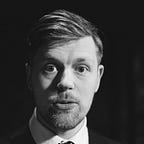Playing life in easy mode
Caught between #YesAllWomen & #NotAllMen
I am a straight white male.
It’s a pretty sweet deal.
Writer John Scalzi likens it to playing life on the very lowest difficulty setting. Sure, I still have to move around, talk to people, achieve my goals and generally get things done but everything is just that little bit easier, faster and more pleasant for me.
Why don’t I tell you a little about what it’s like to be me?
Firstly, no one questions me if I say I want to direct films or race cars or lead countries. Society is used to people like me doing all those things. In fact almost all popular culture is a) made by people who look like me & b) made for people who like the things I like.
I am allowed to be ambitious, it is seen as an attractive quality. I can marry whomever I fancy (best case scenario: they fancy me back) and nobody will stand in my way. In fact, many people will throw confetti and cheer. I can wear what I want, show as much leg as I please, then I can go for a walk and reasonably expect not to be verbally or physically abused. Religious leaders tend to be old versions of me. Marketers (young slick versions of me) are falling over themselves to get me to buy their products, so they fill their adverts with things I like: pretty ladies and explosions and cars going really fast.
I can play sports to an extremely high level (in theory at least) and people will pay to watch me play. It will be deemed important. I can invent a new kind of computer, solve a dastardly murder and open a Michelin-starred restaurant and my gender won’t be the story, my achievements will be. People will be all like “That is one technologically adept, crime-solving chef right there…” and they won’t feel the need to follow that up with ‘…and can you believe he’s a MAN?’.
I am allowed to be funny. I am allowed to exceed everyone’s expectations. I am playing life in easy mode.
Now that’s not to say that there aren’t millions of men who reject this status quo and are actively working in partnership with their differently gendered kin to try and redress the balance. In fact when the #yesallwomen hashtag took over Twitter earlier this year, a lot of us got a little bit sniffy. We were hurt that we had been unceremoniously cast as the enemy when we had been fighting alongside our female friends and colleagues all along. But even a cursory glance at any aspect of modern society should be enough to remind us that when it comes to gender inequality it tends to be us doing the doing and the women doing the being done to.
That’s the reason that so much work on gender is about working to empower women. But you know what? If it’s the men doing the oppressing perhaps we should be working with them too? We can’t just throw up our hands and say “It’s not me, it’s that other kind of man”. We have to accept that through a lottery of nature and nurture, we are all capable of perpetrating this horrible abuse. The facts — 400,000 women sexually assaulted in the UK in 2013, 4 in every 10 Zambian women exposed to gender-based violence — are too all-pervasive to come to any other conclusion. As with so much development, education can make all the difference.
The Centre for the Prevention of Violence (CEPREV) is a Christian Aid partner that works for peace in Nicaragua. They realised very early on in their 16 year history that the enemy were not the young male gang members who terrorised deprived neighbourhoods in the capital of Managua. The enemy was the cultural image of masculinity, something to be earned through violence on the streets and total, unquestioned authority at home. It may seem trite to say this but these men were victims too — victims of a system of beliefs that expected them to prove themselves worthy by abusing women and killing each other.
Bayardo Fargas grew up feeling helpless and angry as he witnessed the beatings his Mum endured at the hands of her husband. Almost inevitably Bayardo turned to the streets, becoming a heavy drug user, drug dealer and gang member in the process. “I don’t think I carry any dead behind me. But I’ve injured a lot of people” he says.
Today, after many years of support and counselling sessions from CEPREV his life has been transformed. He has helped to dismantle his gang and is now a committed husband and father of two children. He works as a painter and decorator. He also volunteers with CEPREV reaching out to other young men in his neighbourhood, in order to stop the cycle of drugs and violence continuing. In fact, the work of CEPREV has significantly reduced violence in many neighbourhoods of Managua. All because CEPREV saw men like Bayardo as potential solutions to the problem. It would have been so easy to write them off as irredeemable thugs.
I am a straight white male.
The idea that I might let violence define my identity is as alien to me as the idea that my gender limits my value.
I’m playing life in easy mode.
But now it’s time to stop playing …
